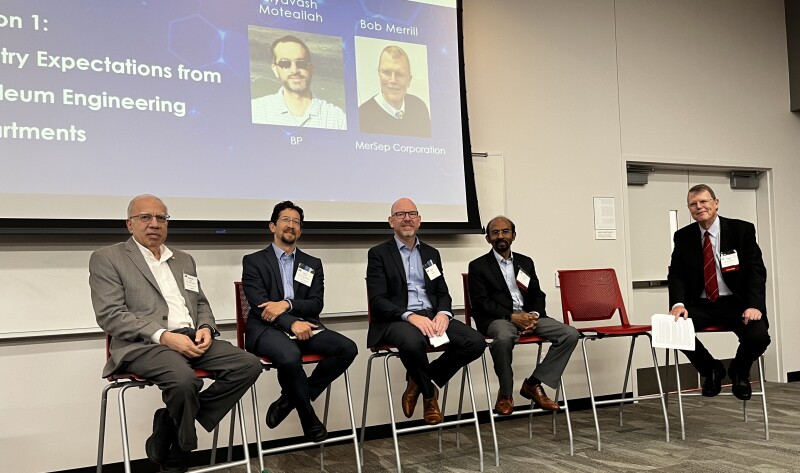In an uncertain time for the energy industry, the fundamentals are more important than ever.
The tools a petroleum engineer uses may change over the years, but that expert will still need to understand the basics, ConocoPhillips Chairman and CEO Ryan Lance said during the SPE/PEDHA Fueling the Future: Petroleum Engineering Industry/Education in a New Era workshop in Houston on 8 August.
“Petroleum engineers need to understand fluid flow through porous media, transmissibility equations, Darcy flow equations, material balance equations,” he said. “Tools have made the job a whole lot easier, and a lot more efficient, but you’ve still got to understand what the data is telling you. You still have to have that foundation and understanding.”
In short, he said, a petroleum engineer should understand the equations well enough to know when the outputs based on the inputs aren’t right, or “making sure garbage in isn’t garbage out.”
David Reid, a senior vice president at Shell, also highlighted foundational knowledge as being important.
“Technical skills around fluid characterization, rock characterization, reservoir characterization, integration of data, production forecast, uncertainty management, all that stuff that's very typical, I think, is very foundational,” he said.
While tools and high-performance computing have evolved, allowing the industry to do more difficult things, he said, the fundamental principles are still necessary.
“Petroleum engineering as a discipline tends to be the integrator of the other disciplines, whether it's geophysics, geology, production, technology … they tend to end up at the center of the wheel of integrating” activities, Reid said. That means integration skills, specifically project management, are important, he added.
Something else industry experts need is the ability to articulate and live with uncertainty, which may come more naturally to geophysicists than to engineers, Brant Hasebe, BP’s vice president for subsurface disciplines, said.
For instance, when he was an engineering student in university, there was an emphasis on “a right answer, a certain level of precision.”
But when working in the oil industry, Hasebe said, things aren’t always that clear.

“There's uncertainty with every bit of data and information that we get out of the subsurface. The measurements are not direct. There are some secondary, tertiary measurements. They're error prone. There's a range there for each of the inputs, and so necessarily, there's a range of the outputs, and we have to manage that in a business setting … to make a new decision based on what's the risk of different outcomes actually manifesting, and how you can mitigate those risks if they come through.”
That approach is more typically learned in real life than through university, Hasebe said.
Susan Howes, vice president of engineering at Subsurface Consultants & Associates, said it’s important to teach students “to learn how to learn” through classes, labs, field work, internships, and more.
“All those things teach them different skills, but they are learning how to learn,” she said. “Lifelong learning is what we’re trying to espouse.”
Hasebe said students in college may view entering a petroleum engineering program as too restrictive, particularly when there’s uncertainty as to whether they’ll be able to pick up jobs after earning petroleum engineering degrees.
Mohamed Soliman, a professor at the University of Houston, said universities need feedback about what kinds of graduates energy companies want to hire and how likely it is that graduates will find employment.
Engineers Needed
Looking forward, the world will continue to need oil and gas, even as it increases the share of renewables in the energy mix.
“People are understanding that cheap, affordable, reliable energy is the key. And it's going to take an expansion of the entire energy system to accommodate that,” Lance said.
The petroleum engineering landscape looks good far into the future, he said.
“This is a business that isn't going away. The existential threat to the business is not right around the corner,” he said. “Certainly, the skill set of an engineer 40 and 50 years from this date is going to be different than the skill set today. Absolutely. And you all are going to have to morph. I can't predict what that's going to look like, but there will still be petroleum engineers needed 50 years from today, I can guarantee you that.”
When it comes to hiring, Lance said, “we need petroleum engineers. We need engineers who know how to think. We'll take mechanical and industrial (engineers) if we have to, we'll teach you how to be petroleum engineers.”
And once hired into a company like ConocoPhillips, those engineers will likely work in multidisciplinary teams and have the opportunity to become a functional or technical expert—with a very deep expertise—or have a less deep expertise but wider experience across the company, he said.
“By and large, 80% of our people are a little bit less deep and very wide, because we work in very multidisciplinary team environments. But that doesn't mean you can't be a functional expert inside our companies,” Lance said. “In the business, we need both.”
Finding Engineers
As far as Lance is concerned, it’s important to invest in education at multiple levels, not just through universities.
“If you can read at grade level in the third grade, and you can pass algebra by the eighth grade, you have an 80% chance of going on to higher education,” he said.
As such, ConocoPhillips is investing money in regions where the company operates to support reading at the third-grade level and passing algebra in the eighth grade, he said.
Internships are one of the key ways oil companies find personnel.
Lance said ConocoPhillips’ latest intern class has 150 people in it, of whom half were female, nearly a third were people of color, and nearly one-quarter were returning interns.
“We know that the best way we can compete for the best students out there is to offer them multiple years of internship with real jobs, working for good mentors,” he said. The company has reinstituted “a pretty aggressive internship program so we can compete for the talent that we know is out there.”
Robello Samuel, chief tech advisor and technology fellow at Halliburton, said company views of what new graduates prioritize when it comes to employment don’t necessarily align with what they actually prefer. Companies tend to think the workforce values salary and ability to work with new tech more than they do, he said, while underestimating how much the workforce values work/life balance, job stability, on-the-job happiness, and agreement with the work that they do.
“They have not been in lockstep with the expectations of the new workforce,” Samuel said.


